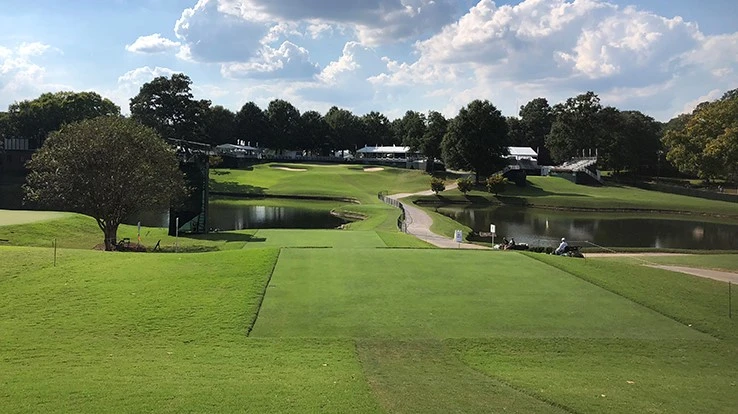
Guy Cipriano
In 2008, Carolinas GCSA executive director Tim Kreger had an epiphany. After meeting with representatives of both Clemson and NC State to discuss budget cuts as a result of the economic recession impacting turfgrass programs at our land grant institutions, he recalled a fundraising effort for the Clemson men’s golf team.
A donated round of golf for four at a prominent facility in South Carolina went unsold in the silent auction. The gift certificate later sold online for $250, and the idea for Rounds 4 Research was born. Tim figured if there are approximately 900 golf courses in North and South Carolina and each donated one round of golf to be sold at auction, we could finance vital turfgrass research without the needs of funding from state governments.
Four years later, R4R had grown larger than Carolinas GCSA could operate internally as other states like Virginia, Georgia and Texas had joined, and the program was transferred to GCSAA. R4R is now organized by GCSAA’s philanthropic arm, the Environmental Institute for Golf. Since going national in 2012, R4R has generated over $1 million, and I’m pleased to report in North and South Carolina we have distributed over $366,000 to Clemson and NC State since the program’s inception.
Which brings me to why I’m writing about R4R today. This year’s auction is April 29-May 5. Last year’s auction generated more than $312,000 – GCSAA’s largest total since taking over. But that is still only a small drop in the proverbial bucket when you realize there are approximately 15,000 golf facilities in the United States. What would happen if each facility nationwide sold one foursome at auction for the low price of $66.67 each? You would raise $1 million!
You may think I’m crazy. But I truly believe with nearly 15,000 golf facilities nationwide and approximately 19.5 million “committed golfers” (as reported by the National Golf Foundation in 2018) we can together fund research that will help provide better playing conditions in the future. Whether it’s developing more drought-tolerant grass varieties, discovering disease and pest resistant cultivars or helping states establish and implement Best Management Practices – the possibilities are limitless.
I know what you’re thinking, not every golf course in the U.S. can participate. Some facilities just are not willing to open their doors to Joe Q. Public. You’re right, but that doesn’t mean they can’t help. We encourage our member facilities in North and South Carolina in similar circumstances to make a monetary donation in an amount equivalent to four guest fees to help the cause.
Another thing we have done successfully in the Carolinas is gain allied support. We have partnered with our regional golf associations, the Carolinas PGA Chapter, the Carolinas CMAA and the owner’s associations of both North and South Carolina to raise the level of awareness and make it easier for a superintendent to request a donated foursome from his or her facility. And why are state/regional golf associations an important partnership? They have databases with thousands of golfers that would love to know about the auction and bid on these rounds. Ever hear of GHIN handicap?
In fact, my facility, Carolina Golf Club, did not participate in the first R4R auction. After reopening from renovation, our general manager at the time did not want to ask the board for permission considering we had been closed for 11 months. One year later, our GM received a letter from his CMAA chapter about the upcoming second R4R auction and he instructed me to make the donation without ever discussing with the Board. The simple fact his professional association endorsed the cause swayed his opinion.
So, I encourage you to get involved. I reached out to Arkansas GCSA to lend support as a favor to Dr. Mike Richardson. Dr. Doug Karcher, Richardson and others do a great job at the University of Arkansas. When I heard back from Arkansas GCSA President Dade Wilson, I was pleased to hear he and his fellow directors are making a concerted effort to increase their chapter’s participation. Believe me, every dollar counts and researchers across the country are resourceful at stretching research dollars. Heck, sometimes it’s as simple as acquiring new mowers and/or other equipment that benefits us all.
GCSAA is committed to seeing this program’s success grow. They formed a Task Group two years ago to brainstorm ideas. From these conversations we’ve seen an increased presence on social media, air time on Sirius XM PGA Tour Radio, and promotional support sponsored by Golf Channel, Golf Advisors and Golf Now. All these efforts help spread the message to the committed golfers. It’s up to us to procure the rounds for these committed folks to bid on.
How You Can Get Involved
- Go to https://www.eifg.org/research/rounds-4-research
- Click on donate rounds in the upper right-hand corner
- Enter your course’s information in the online donation form
- You can specify the number of players, days and time of week, etc.
- Identify the GCSAA Chapter you want your proceeds to benefit
- You can even donate for the next three years by clicking a box in the online form
Matthew Wharton, CGCS, MG, is the superintendent at Carolina Golf Club in Charlotte, N.C., and President of the Carolinas GCSA. Follow him on Twitter @CGCCGreenkeeper.
Latest from Golf Course Industry
- Carolinas GCSA raises nearly $300,000 for research
- Advanced Turf Solutions’ Scott Lund expands role
- South Carolina’s Tidewater Golf Club completes renovation project
- SePRO to host webinar on plant growth regulators
- Turfco introduces riding applicator
- From the publisher’s pen: The golf guilt trip
- Bob Farren lands Carolinas GCSA highest honor
- Architect Brian Curley breaks ground on new First Tee venue





